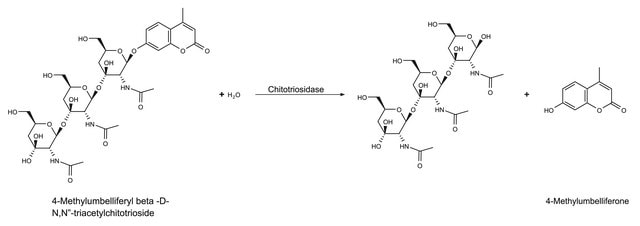CS1030
Chitinase Assay Kit, Fluorimetric
sufficient for 200 multiwell tests
Sinónimos:
Chitinase Detection Kit
Iniciar sesiónpara Ver la Fijación de precios por contrato y de la organización
About This Item
UNSPSC Code:
12161503
NACRES:
NA.84
Productos recomendados
usage
sufficient for 200 multiwell tests
Quality Level
shipped in
wet ice
storage temp.
−20°C
Gene Information
human ... CHIT1(1118)
General description
The kit assay is based on the enzymatic hydrolysis of chitinase substrates. This enzymatic hydrolysis releases 4-methylumbelliferone (4MU), which upon ionization in basic pH, can be measured fluorimetrically at an excitation wavelength of 360 nm and an emission wavelength of 450 nm. The use of fluorimetric substrates provides a very sensitive detection system.
Application
The Chitinase Assay Kit provides all the reagents required for efficient and sensitive detection of chitinase activity in fungal and bacterial growth media, macrophage lysates, and purified enzyme preparations. In addition, the kit provides three different substrates for the detection of the various types of the chitinolytic activity:
- 4-Methylumbelliferyl N,N′-diacetyl-β-D-chitobioside - substrate suitable for exochitinase activity detection (chitobiosidase activity)
- 4-Methylumbelliferyl N-acetyl-β-D-glucosaminide - substrate suitable for exochitinase activity detection (β-N-acetylglucosaminidase activity)
- 4-Methylumbelliferyl β-D-N,N′,N′′-triacetylchitotriose - substrate suitable for endochitinase activity detection
Biochem/physiol Actions
Chitinase catalyzes the hydrolytic cleavage of the β-1→4-glycoside bond present in biopolymers of N-acetylglucosamine, primarily in chitin. Chitinases are widely distributed in living organisms and are found in fungi, bacteria, parasites, plants, and animals. They are classified in families based on amino acid sequence similarities.
The chitinolytic enzymes are also categorized based on their enzymatic action on chitin substrates. Endochitinases are defined as the enzymes catalyzing the random cleavage at internal points in the chitin chain. Exochitinases catalyze the progressive release of acetylchitobiose or N-acetylglucosamine from the non-reducing end of chitin, and are referred to as chitobiosidase and β-N-acetylglucosaminidase, respectively.
Chitinases perform different functions in different organisms. In bacteria, they are mainly involved in nutritional processes. In yeast and various fungi, these enzymes participate in morphogenesis. In animals and plants, chitinases primarily play a role in the defense of the organism against pathogen attack.
The chitinolytic enzymes are also categorized based on their enzymatic action on chitin substrates. Endochitinases are defined as the enzymes catalyzing the random cleavage at internal points in the chitin chain. Exochitinases catalyze the progressive release of acetylchitobiose or N-acetylglucosamine from the non-reducing end of chitin, and are referred to as chitobiosidase and β-N-acetylglucosaminidase, respectively.
Chitinases perform different functions in different organisms. In bacteria, they are mainly involved in nutritional processes. In yeast and various fungi, these enzymes participate in morphogenesis. In animals and plants, chitinases primarily play a role in the defense of the organism against pathogen attack.
Suitability
The kit was tested and found suitable for Trichoderma viride and Streptomyces griseus, along with Hela, Jurkat, CHO, NIH-3T3, U-837 mammalian cell lines, human macropages, rat lung, kidney, liver, and brain tissue.
Preparation Note
Use ultrapure water for preparation of reagents.
Solo componentes del kit
Referencia del producto
Descripción
- Assay Buffer 25 mL
- 4-Methylumbelliferyl N-acetyl-β-D-glucosaminide 5 mg
- 4-Methylumbelliferyl β-D-N,N′-diacetylchitobioside hydrate 5 mg
- 4-Methylumbelliferyl β-D-N,N′,N′′-triacetylchitotriose 5 mg
- Chitinase from Trichoderma viride 1 mg
- 4-Methylumbelliferone Standard Solution, 50 mg/mL 1 mL
- Sodium Carbonate 2 g
- Dimethyl Sulfoxide 1 mL
Ver todo (8)
signalword
Danger
hcodes
Hazard Classifications
Eye Irrit. 2 - Resp. Sens. 1
Storage Class
10 - Combustible liquids
flash_point_f
Not applicable
flash_point_c
Not applicable
Certificados de análisis (COA)
Busque Certificados de análisis (COA) introduciendo el número de lote del producto. Los números de lote se encuentran en la etiqueta del producto después de las palabras «Lot» o «Batch»
¿Ya tiene este producto?
Encuentre la documentación para los productos que ha comprado recientemente en la Biblioteca de documentos.
Los clientes también vieron
S S Thimoteo et al.
Brazilian journal of medical and biological research = Revista brasileira de pesquisas medicas e biologicas, 50(1), e5658-e5658 (2017-01-12)
Chitinases are hydrolases that degrade chitin, a polymer of N-acetylglucosamine linked β(1-4) present in the exoskeleton of crustaceans, insects, nematodes and fungal cell walls. A metagenome fosmid library from a wastewater-contaminated soil was functionally screened for chitinase activity leading to
Computational modeling and functional characterization of a GgChi: A class III chitinase from corms of Gladiolus grandiflorus
Rafiq M, et al.
The Kaohsiung Journal of Medical Sciences (2018)
Daniel Hartmann et al.
Future oncology (London, England), 11(2), 193-203 (2014-07-22)
N-acetyl-glucosaminidase (NAG) is a potential marker of genotoxicity. We retrospectively analyzed plasma NAG and clinico-pathologic features in advanced gastrointestinal adenocarcinoma patients. Plasma from 118 patients and 51 healthy volunteers was analyzed for associations between NAG levels and age, disease presence
Zhangfa Song et al.
BMC cancer, 19(1), 629-629 (2019-06-27)
This study aimed to evaluate the value of chitinase activity in prognosticating the occurrence of metastasis in and prognosis of patients with colorectal cancer (CRC). The chitinase activity in four different groups, namely 335 CRC patients without distant metastasis at
Svetlana E Belova et al.
Frontiers in microbiology, 9, 2775-2775 (2018-12-05)
Members of the Acidobacteria are among the most efficient colonizers of acidic terrestrial habitats but the key traits underlying their environmental fitness remain to be understood. We analyzed indigenous assemblages of Acidobacteria in a lichen-covered acidic (pH 4.1) soil of
Nuestro equipo de científicos tiene experiencia en todas las áreas de investigación: Ciencias de la vida, Ciencia de los materiales, Síntesis química, Cromatografía, Analítica y muchas otras.
Póngase en contacto con el Servicio técnico









